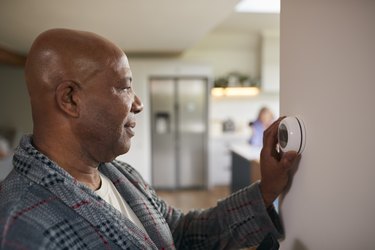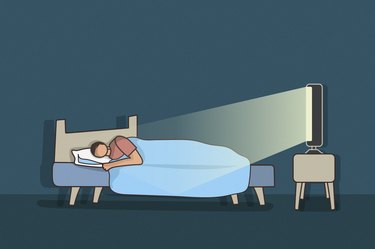
If you've ever spent the night tossing and turning in a too-warm bedroom (or shivering in a frigid one), you know that temperature plays a pretty important role in getting a good night's sleep. After all, one of the first pieces of advice sleep experts typically recommend is to keep your room dark, quiet and cool.
But how cool is cool enough, and when does too cool become downright cold? While there's no one perfect bedroom temperature that works for everyone, our bodies snooze best when the thermostat sticks within a pretty specific range.
Video of the Day
Video of the Day
"The ideal temperature for sleep is approximately 65 degrees, give or take a few degrees. This ensures a cool environment to fall asleep and stay asleep," Thomas Bradley Raper, MD, a sleep medicine specialist with Texas Health Presbyterian Hospital Dallas, tells LIVESTRONG.com.
That said, you might find you need things a touch warmer or cooler to get the deep slumber you crave. For most people, a temperature somewhere in the range of 60 to 67 degrees is ideal for sleep, according to the Cleveland Clinic.
What Happens When Your Room Gets Too Hot or Too Cold?
Both overly warm and overly chilly environments can be bad for shut-eye. Both can cause you to wake more often during the night and have less rapid eye movement (REM) and deep sleep, per a May 2012 paper in the Journal of Physiological Anthropology. (If you're wondering whether one is worse than the other, "a hot environment has shown to have more tendency to cause sleep disruption," Dr. Raper says.)
That can leave you feeling worn out and moody during the day, and over time, could up your risk for serious health problems including obesity, depression, diabetes and heart disease, according to the Centers for Disease Control and Prevention (CDC).
Tips to Get the Temp Just Right
Sometimes getting a comfortable bedroom temperature is as simple as adjusting the thermostat. But when you don't have control to change your room temp or you share a room with someone who likes the temperature the way it is, you'll have to make some other adjustments. Some strategies to try:
- Put a fan on your side of the bed. Cool air aimed directly at you can help you feel more comfortable without changing the temperature of the room, Dr. Raper notes.
- Layer your bedding. Sleep with a few lightweight, breathable blankets instead of one big one. That way you can add or remove layers as needed throughout the night if you get too hot or too cold.
- Change your pajamas. Layering up or stripping down is an easy way to get warmer or cooler.
- Take a bath before bed. A warm soak one to two hours before going to sleep can actually help your body cool down, Dr. Raper says.
- Pay attention to food triggers. Both sugar and caffeine can increase body temperature and make you prone to feeling too warm, notes the Cleveland Clinic. Steer clear of spicy food before bed too: it can make you sweat.
Was this article helpful?
150 Characters Max
0/150
Thank you for sharing!
Thank you for your feedback!
Is this an emergency? If you are experiencing serious medical symptoms, please see the National Library of Medicine’s list of signs you need emergency medical attention or call 911.


